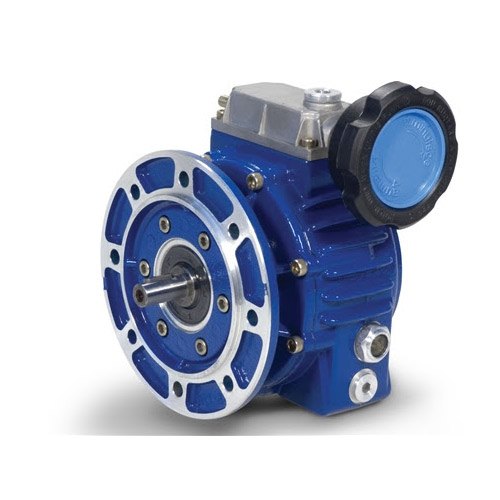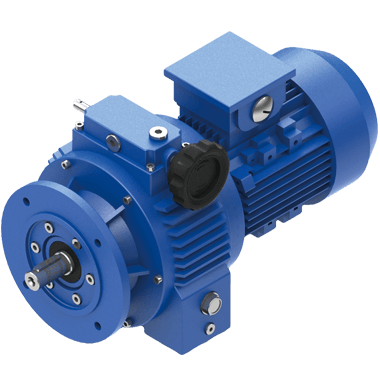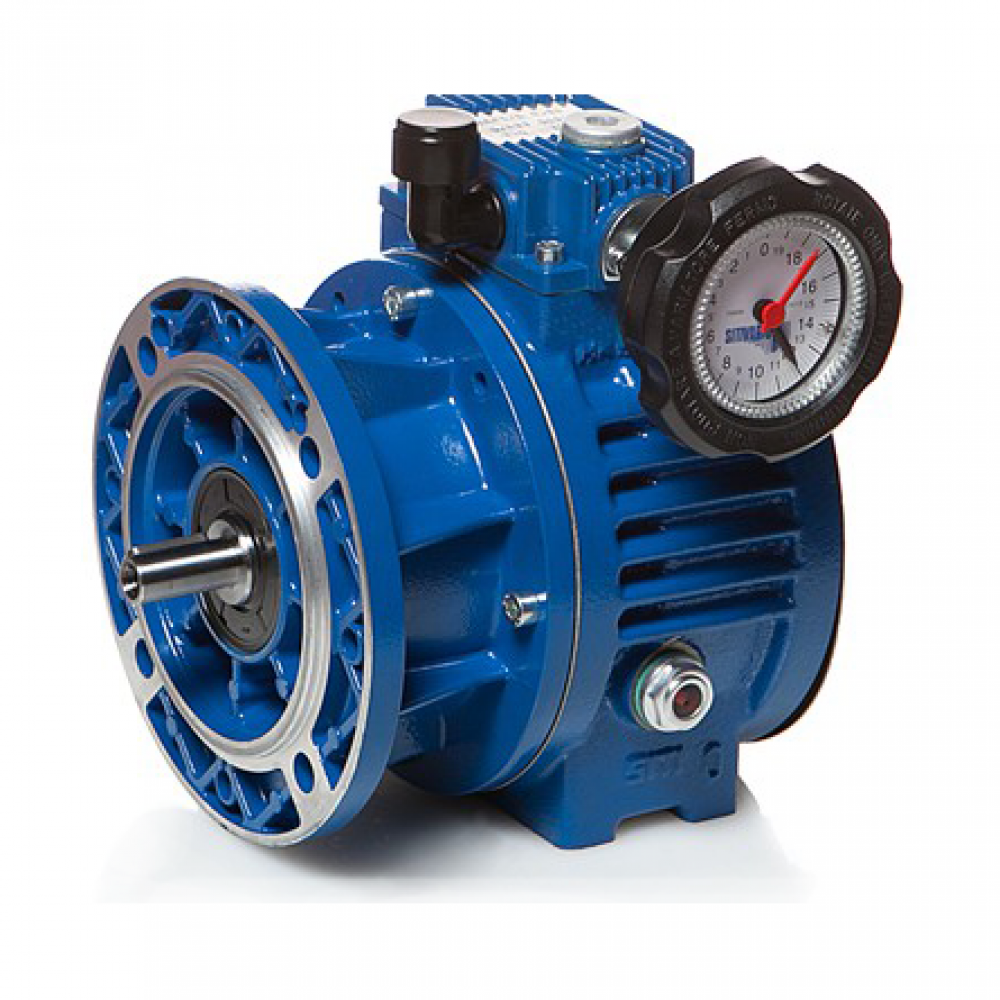Product Description
1) High precision of speed regulating for speed variator,UD gear box: up to 0.5-1 round
2) Large speed-changing range: the speed ratio ranges from 1:1.4 to 1:7 freely
3) High intensity and long serving time
4) Convenient to regulate speed
5) Continuously workable, bidirectional working direction,smooth running,
stable, and quiet
6) Fully sealed and suitable to any environment
7) Compact structure, small size
8) High quality aluminum alloy die-cast, elegant shape, light weight and non-rusting
9) Good adaptability: can be combined with all kinds of reducers to achieve low
stepless speed changing
10) Input power: 0.18-7.5kW
| Power | Model | I | n2(r/min) | M2(NM) |
| 0.18kw | UDL0.18 | 1.6-8.2 | 880-170 | 1.5~3 |
| 0.37kw | UDL0.37 | 1.4-7 | 1000-200 | 3~6 |
| 0.55kw | UDL0.55 | 1.4-7 | 1000-200 | 4~8 |
| 0.75kw | UDL0.75 | 1.4-7 | 1000-200 | 6~12 |
| 1.1kw | UD1.1 | 1.4-7 | 1000-200 | 9~18 |
| 1.5kw | UD1.5 | 1.4-7 | 1000-200 | 12~24 |
| 2.2kw | UD2.2 | 1.4-7 | 1000-200 | 18~36 |
| 3kw | UD3 | 1.4-7 | 1000-200 | 24~48 |
| 4kw | UD4 | 1.4-7 | 1000-200 | 32-64 |
| Layout: | Cycloidal |
|---|---|
| Hardness: | Hardened Tooth Surface |
| Installation: | Vertical Type |
| Customization: |
Available
|
|
|---|
.shipping-cost-tm .tm-status-off{background: none;padding:0;color: #1470cc}
|
Shipping Cost:
Estimated freight per unit. |
about shipping cost and estimated delivery time. |
|---|
| Payment Method: |
|
|---|---|
|
Initial Payment Full Payment |
| Currency: | US$ |
|---|
| Return&refunds: | You can apply for a refund up to 30 days after receipt of the products. |
|---|

Can variators be customized for specific industries or machinery configurations?
Yes, variators can be customized to meet the specific requirements of different industries and machinery configurations. Manufacturers of variators understand that different industrial applications may have unique needs in terms of load characteristics, operating conditions, control system integration, and other factors. As a result, they offer customization options to ensure optimal performance and compatibility. Here are some ways variators can be customized:
1. Load and Torque Ratings:
Variators can be customized to handle specific load requirements and torque ratings. Manufacturers can design and manufacture variators with different torque capacities to match the demands of different machinery or equipment. This customization ensures that the variator can effectively handle the expected load conditions without exceeding its torque limitations or compromising performance.
2. Speed Range:
Depending on the machinery configuration and application requirements, variators can be customized to provide the desired speed range. Manufacturers can adjust the gear ratios and design the variators to operate within specific speed ranges to match the speed requirements of the machinery. This customization allows for precise control and optimization of the machinery’s speed performance.
3. Environmental Considerations:
Variators can be customized to meet specific environmental conditions. Certain industries or machinery configurations may require variators that can withstand harsh environments, such as high temperatures, extreme humidity, or exposure to dust and debris. Manufacturers can incorporate enhanced protection and sealing mechanisms to ensure the variators can operate reliably in these challenging conditions.
4. Control System Integration:
Variators can be customized to integrate seamlessly with different control systems. Manufacturers can adapt the communication interfaces and protocols of the variators to match the specific requirements of the machinery’s control architecture. This customization allows for smooth integration with existing control systems, such as programmable logic controllers (PLCs) or other automation systems.
5. Mounting and Form Factor:
Variators can be customized to accommodate specific mounting configurations and form factors. Different machinery configurations may require variators with specific dimensions, mounting options, or shaft configurations to ensure proper installation and compatibility. Manufacturers can provide custom solutions to meet these specific mounting and form factor requirements.
6. Additional Features and Accessories:
Manufacturers can offer customization options by incorporating additional features and accessories into the variators. These can include specialized connectors, monitoring sensors, remote control capabilities, or specific software functionalities. By tailoring the variators with these additional features, they can better align with the unique needs of the industry or machinery configuration.
7. Compliance with Industry Standards:
Variators can be customized to meet specific industry standards and certifications. Depending on the industry or application, there may be specific regulatory or safety standards that variators need to comply with. Manufacturers can customize the design and manufacturing processes to ensure that the variators meet these standards and certifications.
In conclusion, variators can be customized to suit specific industries or machinery configurations. Manufacturers offer customization options to address factors such as load requirements, speed range, environmental conditions, control system integration, mounting configurations, additional features, and compliance with industry standards. By customizing variators, industries can ensure optimal performance and compatibility with their specific machinery and application needs.

What is the impact of variators on the lifespan of mechanical components in a system?
The impact of variators on the lifespan of mechanical components in a system is a crucial consideration. Variators, such as continuously variable transmissions (CVTs), can have both positive and negative effects on the longevity of mechanical components. Here’s a detailed explanation of the impact of variators on the lifespan of mechanical components:
1. Reduced Wear and Tear:
Variators can contribute to reduced wear and tear on mechanical components compared to traditional transmissions with fixed gear steps. The continuously variable nature of variators allows for smoother and seamless gear ratio changes, eliminating the shock and stress associated with gear shifts in conventional transmissions. This smoother operation can reduce the strain on various components like gears, synchronizers, and clutch packs, potentially extending their lifespan.
2. Improved Power Delivery:
Variators optimize power delivery by continuously adjusting the gear ratios to keep the engine in its most efficient operating range. By operating the engine within its optimal powerband, variators can reduce the load and stress on mechanical components. When the engine operates more efficiently, it can lead to reduced wear on components like pistons, connecting rods, and crankshafts, potentially increasing their lifespan.
3. Enhanced Cooling and Lubrication:
Variators often incorporate advanced cooling and lubrication systems to maintain optimal operating conditions. These systems help manage heat generated during operation and ensure proper lubrication of critical components. Effective cooling and lubrication can prevent excessive heat buildup, reduce friction, and minimize wear on bearings, shafts, and other moving parts. By providing better cooling and lubrication, variators can help extend the lifespan of these mechanical components.
4. Increased Complexity and Component Interdependence:
Variators, especially electronic or computer-controlled ones, can introduce increased complexity and component interdependence within the system. The integration of electronic control systems, sensors, and actuators adds additional components that can potentially fail or require maintenance. The interdependence of these components means that a failure in one part can affect the overall performance and lifespan of the variator and other mechanical components. Proper maintenance, regular inspections, and timely repairs are crucial to mitigate potential issues and ensure the longevity of the system.
5. Maintenance and Service Requirements:
Variators may have specific maintenance and service requirements to ensure their optimal performance and longevity. Regular fluid changes, inspections, and adjustments may be necessary to keep the variator and associated mechanical components in good working condition. Adhering to the manufacturer’s recommended maintenance schedule is important to prevent premature wear and failure of components. Neglecting maintenance can lead to accelerated wear, reduced lifespan, and potential costly repairs.
6. Quality of Design and Manufacturing:
The overall lifespan of mechanical components in a variator system can be influenced by the quality of design and manufacturing. Variators and their associated components should be designed and manufactured to meet specific performance and durability standards. High-quality materials, precise engineering, and stringent quality control can contribute to the longevity of mechanical components. Variators from reputable manufacturers with a track record of reliability and performance are more likely to have a positive impact on the lifespan of mechanical components.
7. Driving Habits and Operating Conditions:
The impact of variators on the lifespan of mechanical components can also be influenced by driving habits and operating conditions. Aggressive driving, excessive loading, and operating the vehicle in extreme conditions can put additional stress on the variator and associated components. Continuous high RPM operation, abrupt throttle inputs, or towing heavy loads can accelerate wear and potentially shorten the lifespan of mechanical components. Operating the vehicle within recommended limits and practicing responsible driving habits can help preserve the longevity of the system.
In conclusion, variators can have both positive and negative impacts on the lifespan of mechanical components in a system. The continuously variable nature of variators can reduce wear and tear, improve power delivery, and enhance cooling and lubrication. However, increased complexity, maintenance requirements, and the quality of design and manufacturing are factors to consider. Additionally, driving habits and operating conditions play a significant role in determining the lifespan of mechanical components. Regular maintenance, proper care, and responsible driving practices are essential to ensure the longevity of the variator system and its associated mechanical components.

Can you provide examples of products or machinery that use variators for speed control?
Yes, variators are used in a wide range of products and machinery for speed control purposes. The ability to adjust the gear ratio continuously makes variators ideal for applications where precise speed control is required. Here are some examples of products and machinery that utilize variators for speed control:
1. Automobiles:
In the automotive industry, variators are commonly used in continuously variable transmissions (CVTs) for speed control in passenger cars, SUVs, and other vehicles. CVTs with variators allow for seamless and continuous adjustment of the gear ratio, enabling precise speed control and efficient power delivery. Variators in automobiles contribute to improved fuel efficiency, smoother acceleration, and enhanced driving comfort.
2. Motorcycles and Scooters:
Variators are also utilized in the transmissions of motorcycles and scooters for speed control. CVTs with variators provide riders with the ability to adjust the speed output smoothly and precisely. By continuously varying the gear ratio, variators offer a responsive and customizable riding experience, allowing riders to adapt to different road conditions and riding preferences.
3. Industrial Machinery:
In industrial settings, variators are used in various types of machinery that require speed control. For example, variators can be found in conveyor systems, where they allow for precise adjustment of the conveyor belt speed to match the specific production requirements. Variators are also used in pumps, fans, mixers, and other equipment that need variable speed control to optimize performance and energy consumption.
4. Agricultural Equipment:
Agricultural machinery, such as tractors, combines, and harvesters, often utilize variators for speed control. Variators in these machines allow farmers and operators to adjust the speed according to the specific tasks at hand, such as plowing, seeding, or harvesting. This flexibility enables efficient operation in various agricultural operations and field conditions.
5. Construction and Earthmoving Equipment:
Variators are used in construction and earthmoving equipment to regulate the speed of machines like excavators, loaders, and bulldozers. By controlling the gear ratio, variators enable operators to adjust the speed of these machines, allowing for precise and efficient performance in tasks such as digging, lifting, and pushing materials.
6. Marine Applications:
Marine vessels, including boats, yachts, and ships, utilize variators for speed control. In marine applications, variators are employed to adjust the propeller speed and optimize power delivery based on the desired speed and operating conditions. Variators in marine applications offer benefits such as improved fuel efficiency, enhanced maneuverability, and smooth acceleration.
7. HVAC Systems:
Variators are used in heating, ventilation, and air conditioning (HVAC) systems for speed control of fans and blowers. By adjusting the gear ratio, variators allow for precise control of the airflow, ensuring that the fans operate at the desired speed for efficient heating, cooling, and ventilation in residential, commercial, and industrial settings.
8. Exercise Equipment:
In the fitness industry, variators are employed in exercise equipment such as treadmills, elliptical trainers, and stationary bikes. Variators enable users to adjust the speed and resistance levels of the equipment, providing a customizable workout experience to meet individual fitness goals and preferences.
In summary, variators for speed control are utilized in a wide range of products and machinery, including automobiles, motorcycles, industrial machinery, agricultural equipment, construction and earthmoving machinery, marine applications, HVAC systems, and exercise equipment. The ability to continuously adjust the gear ratio allows for precise speed control, optimizing performance and efficiency in various applications.


editor by CX 2023-11-27